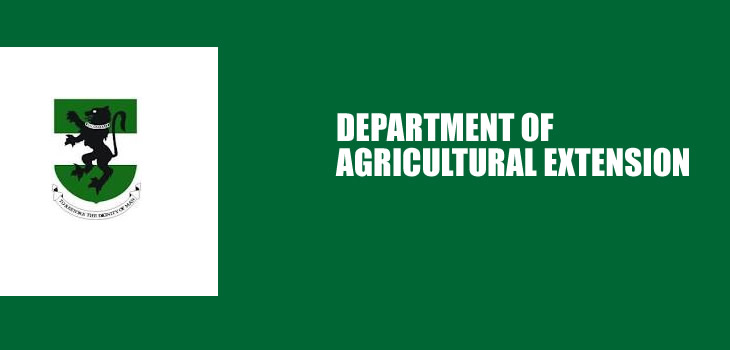History of the Department
The programme in Agricultural Extension in the University of Nigeria was initiated at the instance of UNICEF in 1965, when the agency entered into an agreement with the University to support the programme for a period of five years. This was done because it was realized that the programmes of the Faculty of Agriculture were defective without a programme in Agricultural Extension. Agricultural development was conceptualized as a system held in place by three important links agricultural education (which includes soil, crop and animal scientists as well as agricultural economists and extension experts), agricultural research and agricultural extension. The omission of agricultural extension in the Faculty programme was thought a serious one because research and other activities carried out in soil, crops and animals were useless unless their findings were made available to and accepted by farmers; hence, the need for a programme in agricultural extension.
At the inception of the programme in 1965, agricultural extension was organized as part of the Department of Agricultural Economics and Extension because of lack of teaching staff and other logistic support. In 1973/74, the curricular of agricultural economics and extension were restructured to permit two degree options Agricultural Economics and Agricultural Extension. In 1981, as a result of greater national awareness of the importance of agricultural extension, the University Senate created a separate Department. The programme started in 1981; the trend in student enrollment at undergraduate and postgraduate levels as well as staff disposition has been in the upswing.
Philosophy
The founders of the University of Nigeria believed that there was need to train Nigerian Youths locally, and in sufficient numbers, for the formidable task of disseminating useful and practical information from the research base to the rural farm families for sustainability food production. Agricultural Extension is based on the philosophy that rural people are intelligent, capable and desirous of receiving information and making use of it for their individual and community welfare. It is purely voluntary and democratic in its approach to people. It is truly anchored on the principle of working with the rural farm families where they are, build on what they have, add to what they know and enabling them to develop themselves. The underlying philosophy of the programme therefore, is to produce graduates who will be theoretically and practically knowledgeable in agricultural production and rural life.
Objectives
The primary objectives of the programme are to:
1. conduct research and to provide a comprehensive and adequate programme of higher education for leaders in the field of agricultural extension and rural development;
2. improve the quality of rural life of the people in the neighboring communities through out-reach programmes, for example, the Okpuje Project;
3. create a favorable teaching learning process that will facilitate a mastery of the concepts, principles, theories, positive attitude, aspiration and skills needed to effectively disseminate innovations (improved technologies, practices and systems) to the rural farm-families;
4. generate a set of new future farmers and farmers wives who can positively influence agricultural and rural development policies; and
5. generate graduates who can practicalise the skills and knowledge gained during practical year by engaging in farming enterprises after leaving school, and demonstrating that farming is a profitable venture.
Scope
The programme commences with the understanding of relevant branches of the natural and management sciences which form the basis of a co-ordinated sequence of applied courses offered in the penultimate and final years. An essential feature of the programme is that opportunities are provided for students to gain a broad training in the basic agricultural sciences in the first three years, and a full year practical training, during the fourth year of the programme, while the fifth or final year is the year of specialization. The requirements for the degree thus include the completion of the general studies programme of the University, required ancillary courses, necessary electives and the completion of specialized courses in Agricultural Extension.
Entry Requirements
The Department has two modes of entry. They are:
i. U.M.E entry mode; and
ii. Direct Entry mode.
i. University Matriculation Examination Mode
Candidates seeking admission through the U.M.E are required to have five credit level passes in the Senior Secondary Certificate Examination (S.S.C.E) or its equivalent. These should include English Language, Biology/or Agricultural Science, Chemistry, either Mathematics or Physics and one social science subject (Economics or Geography) in not more than two sittings.
ii. Direct Entry Mode
To qualify for Direct Entry, candidate must have met the University Matriculation requirements in the relevant subjects plus two level Passes (London/Cambridge/Cameroon) in Chemistry and any of Biology / Botany / Zoology / Agricultural Science / Economics / Physics / Geography / Geology / Mathematics. The Department also accepts OND, NCE, HND in Agricultural Science/Animal Health and related fields with a minimum of Lower Credit (Merit) in addition to the University Matriculation entry requirements.
Job Opportunities
Job opportunities for graduates of agricultural extension exist in both the public and private sector such as State and Federal Ministries of Agriculture, agricultural and commercial banks, private agricultural companies, research institutes such as NIFOR, CRIN, NIIR, IITA, ARMTI etc, faculties of agriculture, schools of agriculture, river basin development authority and agricultural development projects. In addition, graduates of Agricultural Extension may become self-employed as farmers, consultants, agro-input dealers, etc. or work with non-governmental organizations.
Areas of Specialization
Agricultural Administration
Agricultural Communication
Agricultural Extension Education
Agricultural Planning and Evaluation
Rural Sociology
Staff Profile
______________________________________________
Agricultural Extension Abstract


